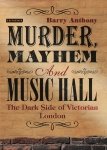In Victorian London, the allure of the Strand attracted people seeking entertainment at taverns, theatres, and variety halls.
However, this historical Strand, distinct from the familiar one today, harbored various vices, including murderers, tricksters, prostitutes, and subversive figures from the music halls.
The question remains: What contributed to the notorious reputation of this area?
Among the structures shaping the Strand’s character, theatres and music halls played crucial roles. In the 19th century, these venues often delved into the darker aspects of Victorian London life.
Both on and off-stage, they contributed to the backdrop of dissolute and nefarious activities.
Barry Anthony highlights a selection of establishments that contributed to the perception of the Strand as a morally questionable thoroughfare.
The Adelphi Theatre
The Adelphi, one of the Strand’s oldest theaters, had ties to crime since its early days. In 1839, the drama “Jack Sheppard” portrayed a young criminal executed in 1724 as a victim of conspiracy and circumstance.
Initially portrayed by Mary Anne Keeley, Jack became a folk hero battling an oppressive establishment, leading to rowdy demonstrations of approval.
The Lord Chamberlain eventually imposed a blanket ban on any play with the name ‘Jack Sheppard’ in its title.
Later in the century, Adelphi melodramas presented a less sympathetic view of law-breakers, with the villain, often played by W. L. Abingdon, opposing charismatic hero William Terriss.
In a tragic turn of events, ‘Breezy Bill’ Terriss was stabbed to death by a jealous actor just outside the theatre.

The Coal Hole
Across the Strand, a specific tavern hosted late-night entertainments that aimed, or rather, aimed not, to mock propriety and challenge the status quo.
Before the implementation of licensing hours in 1872, the Coal Hole stayed open until the early morning, consistently annoying authorities with obscene songs, nude shows, and a satirical ‘Judge and Jury Society.’
The mock trials of this society consistently tackled indecent and controversial topics.
The Tivoli
Established in 1890, the Tivoli Music Hall, known for red-nose comedians and risqué female performers, followed the Coal Hole’s closure by 30 years.
Comedians joked about sex, drunkenness, and misdemeanors; female performers wore revealing costumes and engaged in provocative dances.
The scandalous song “Ta-ra-ra-boom-de-ay,” introduced by Lottie Collins in 1891, became the anthem of a rebellious generation with its suggestive lyrics and dance, provoking hostility.
For years, young girls paid homage by chanting a playground favorite, ‘Lottie Collins has no drawers, Will you kindly lend her yours?’

You may also enjoy: Steve Wright Religion: Is He Christian Or Jewish? Origin And Nationality
The Strand And Gaiety Theatres
Two Strand theatres showcased a distinctly Victorian form of entertainment known as musical burlesque.
In these productions at the Strand and the Gaiety, everything was turned upside down, with men portraying women and vice versa.
Heroic and tragic dramas and operas faced relentless mockery, and contemporary life was satirized through musical numbers and pun-filled rhyming couplets.
Complaints frequently arose about the scantiness of chorus girls’ costumes. However, the most significant scandal associated with this entertainment concerned the audience rather than the actors.
In 1870, after a “Sir George and a Dragon” performance at the Strand Theatre, transvestites Ernest Boulton and Frederick Park were arrested. Men adopting makeup and skirts on stage was acceptable but deemed improper in the auditorium.

Barry Anthony, a historian specializing in the Victorian and Edwardian eras, has written extensively on popular culture and entertainment. His works include “Chaplin’s Music Hall” and “The King’s Jester: The Life of Dan Leno, Victorian Comic Genius.” He also co-authored, with Richard Brown, a pioneering study of early British cinema titled “A Victorian Film Enterprise.” Barry Anthony’s most recent book, “Murder, Mayhem and Music Hall,” is now available.


